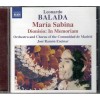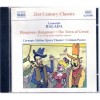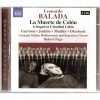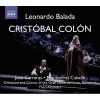Composers
Leonardo Balada (born September 22, 1933, in Barcelona, Catalonia, Spain), is a Catalan American composer, now teaching and composing in Pittsburgh, Pennsylvania.
After studying piano at the Conservatori Superior de Música del Liceu in Barcelona, in 1956 he emigrated to the United States to study at the Juilliard School in New York, from which he graduated in 1960.[1] He studied composition with Vincent Persichetti, Alexandre Tansman and Aaron Copland,[1] and conducting with Igor Markevitch.[2] In 1981, he became a naturalized citizen of the United States.[3] Since 1970 he has been teaching at Carnegie Mellon University in Pittsburgh, Pennsylvania.
His works in the early 1960s are somewhat neo-classical in nature, but the composer was dissatisfied and in 1966 saw a change to an avant-garde style, producing such works like Guernica. The composer felt a need for a change again in 1975, and the works from then onwards are characterized by the combination of folk dance rhythms with avant-garde techniques of the previous period. Harmonically, there is a combination of tonality (folk music) with atonality. Works marking this new trend including Homage to Sarasate and Homage to Casals.
In and out of his stylistic phases, Leonardo Balada's music promises rhythmic excitement, often haunting atmospheres and unceasingly innovative orchestrations.
Recently Added
Biography
Leonardo Balada (born September 22, 1933, in Barcelona, Catalonia, Spain), is a Catalan American composer, now teaching and composing in Pittsburgh, Pennsylvania.
After studying piano at the Conservatori Superior de Música del Liceu in Barcelona, in 1956 he emigrated to the United States to study at the Juilliard School in New York, from which he graduated in 1960.[1] He studied composition with Vincent Persichetti, Alexandre Tansman and Aaron Copland,[1] and conducting with Igor Markevitch.[2] In 1981, he became a naturalized citizen of the United States.[3] Since 1970 he has been teaching at Carnegie Mellon University in Pittsburgh, Pennsylvania.
His works in the early 1960s are somewhat neo-classical in nature, but the composer was dissatisfied and in 1966 saw a change to an avant-garde style, producing such works like Guernica. The composer felt a need for a change again in 1975, and the works from then onwards are characterized by the combination of folk dance rhythms with avant-garde techniques of the previous period. Harmonically, there is a combination of tonality (folk music) with atonality. Works marking this new trend including Homage to Sarasate and Homage to Casals.
In and out of his stylistic phases, Leonardo Balada's music promises rhythmic excitement, often haunting atmospheres and unceasingly innovative orchestrations.






